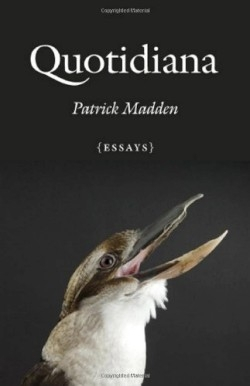Quotidiana
Essays
- 2010 INDIES Winner
- Bronze, Essays (Adult Nonfiction)
Flutter the pages of Patrick Madden’s Quotidiana, and entering it becomes irresistible. A photo of the author placed next to one of Jeffrey Dahmer might ignite the inquisitive spirit—or, if not that aspect of the book, then another. Madden’s curiosity catches. He lures readers in, going so far as to include blank lines with the call to “add your own laugh aphorism (laughorism?)” directly to the text.
A runner-up in the Association of Writers and Writing Program’s 2007 Award Series in Creative Nonfiction, Quotidiana is a notable contribution to the genre. It can be read as a collection of meta-essays, given that Madden ably discusses this text form: “The essay is an open, leisurely form,” Madden writes, “somewhat allergic to adventure, certainly opposed to sensationalism.” Truly a connoisseur of his genre, Madden curates an online compendium of 381 public-domain essays (quotidiana.org).
Despite, or perhaps because of, his intimacy with the essay, Madden is willing to slip out of tradition with a “p.s.” appended to his first piece. This afterthought is in turn followed by an end note that pines for an English word signifying the witty retort one thinks of only too late. Allowing readers into his process, Madden admits when his sentences get away from him, but does not edit them out.
He ruminates and follows the digression. He ponders the word “amanuensis,” for instance, realizing that it’s an anagram for “sun amnesia,” “sane animus,” and “manna issue.” The fact that these terms “all sound wonderfully fascinating” is enough reason to mention them and move on to other marvels. Clearly, this is an embracive work. The second essay, titled “Laughter,” incorporates Pliny the Elder, Joseph Priestly, nitrous oxide, The Lost Tales of Miletus, kookaburras, hyenas, Democritus, the etymology of the word “laughter,” the Jolly Green Giant, Santa Claus, the book of Genesis, Norman Cousins, Candid Camera, the Marx Brothers, W.H. Auden, the song “She’s an Easy Lover,” and Madden’s own children. This essay is representative of Madden’s practice: he weds an intimacy with books and culture to personal experiences as a Mormon missionary in Uruguay, a parent, and the son-in-law of a Uruguayan man who carts vegetables.
For Madden, the artistic life does not mean escaping the routinized. Rather, he values the quotidian, finds the unexpected in the common. This is possible for a mind with encyclopedic and probing knowledge of the world. At once an approachable and postmodern composition, Quotidiana presents an enthralled, reflexive mind at work. Readers will eagerly await his next thought.
Disclosure: This article is not an endorsement, but a review. The publisher of this book provided free copies of the book to have their book reviewed by a professional reviewer. No fee was paid by the publisher for this review. Foreword Reviews only recommends books that we love. Foreword Magazine, Inc. is disclosing this in accordance with the Federal Trade Commission’s 16 CFR, Part 255.

